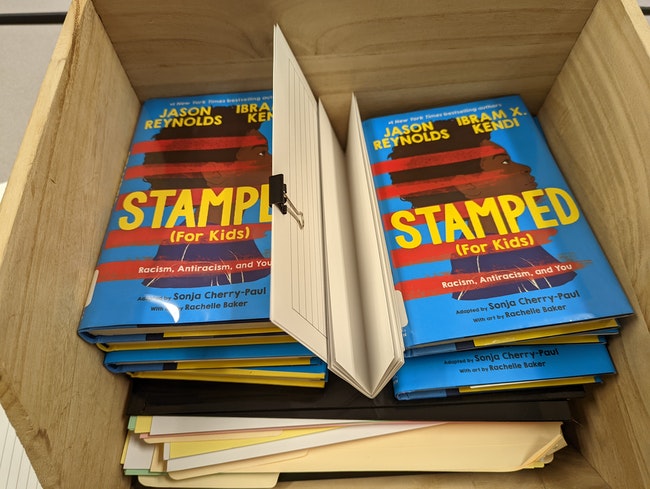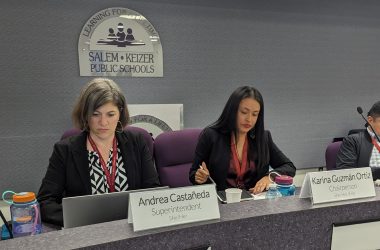A children’s book about the history of racism and antiracist activism in the U.S. will remain in Salem-Keizer School District elementary school libraries following a challenge by a parent.
A district review committee voted 8-1 last week to retain “Stamped (For Kids)” by Ibrahim X. Kendi and Jason Reynolds in elementary school libraries.
The vote came after parent Casity Troutt filed a challenge seeking a review of the book at the district level, calling the book “blatantly factually and historically inaccurate.” Her complaint said the book did not belong in elementary school libraries, though she told the district committee she wasn’t seeking to have the book removed, but wanted a better district process for handling materials with “controversial” subjects.
Troutt is the vice president of SK We Stand Together, a citizen advocacy group that describes itself on its website as focused on “parent’s rights, educational transparency, equal opportunity, academic excellence, and school choice for every student.”
Most recently, the group has challenged district policies allowing transgender students to use bathrooms and locker rooms and play sports corresponding to the gender they live as.
District leaders informed Troutt Monday morning of the decision to retain the book. Troutt told Salem Reporter she’s considering next steps but said the process for review was not transparent and that she intends to keep pushing for changes to it.
Stamped in schools
The district’s library media services offices purchased copies of Stamped (For Kids) in bulk earlier this year for 34 elementary school libraries, district spokesman Aaron Harada said.
The book is a children’s adaptation of Kendi’s book “Stamped” for adults and explains race in the U.S. through the beginnings of the transatlantic slave trade through the present day. It posits that talking about race and racism is an important part of addressing present day racism and explains how historical American figures contributed to segregationist, assimilationist or anti-racist ideas and movements.
The challenge comes as the American Library Association has reported a nationwide escalation in efforts to ban or remove books from libraries and classrooms. In 2021, the association’s Office for Intellectual Freedom tracked 729 challenges to library, school and university materials and services, resulting in nearly 1,600 book challenges or removals.
The association said most books targeted were by or about Black and LGBTQ people.
Troutt requested a review of the book in mid-March after discussing it with Chapman Hills elementary school principal Rachael Harms.
She opposed the book’s inclusion in elementary school libraries in a five-page complaint objecting to the book’s characterization that the “Americans welcomed slavery with open arms and used it to build this country” and its sections describing the Black Panther Party, Rodney King riots and statements that former President Donald Trump promoted racist ideas.
“Children are literal thinkers. The ability to identify bias is especially problematic for your youngest learners because it involves conflicting ideas and goals they do not yet have the developmental maturity to recognize or unpack,” Troutt wrote. She also objected to the book’s lack of cited sources and inline citations.
A new process
The material review was the first the district has undergone since changing its procedure in January.
Previously, a parent with concerns about a book in the school library filed a complaint with the school principal, who would reach a decision about the book. That decision could be appealed to the district’s director of academic achievement, and then, if no agreement was reached, to the superintendent and ultimately the school board.
In January, district administrators adopted a new policy which instead brings any issue not resolved at the school level to a special committee appointed by district administrators. That committee’s decision is final, though a parent may still file a complaint about the process which can ultimately go to the school board.
Suzanne West, the district director of strategic initiatives, said the policy was changed as part of an ongoing review of district policies.
“It’s time. It was an old policy,” she said. The district also incorporated guidelines from the American Library Association, she said, in response to an uptick in books being challenged and removed from U.S. schools.
Parents may also flag any book on their student’s library account, saying that book can’t be checked out without permission, West said. That policy was inadvertently deleted from the revised version of the district’s policy on library material challenges, but is being added back in, she said.
For the Stamped review, Teresa Tolento, the district’s elementary school curriculum director, appointed a nine-member group to read the book and Troutt’s complaint, discuss Troutt’s concerns and the book’s educational merit and then vote on its inclusion.
The committee included two district parents, a high school student, a school librarian, two elementary school teachers, an elementary school principal and middle and high school assistant principals.
District leaders have reviewed two other books in recent years following parent challenges, Tolento said. In 2018, they decided to move the Christian apocalyptic fiction series “Left Behind” from elementary to middle school libraries following a request for reconsideration, Tolento said. In 2015, district leaders opted to retain “George,” a book about a young transgender girl, in school libraries following a challenge.
The “Stamped” review
Troutt told the committee during a meeting last week that despite her complaint, she didn’t want “Stamped (For Kids)” removed from elementary school libraries. She suggested instead that the district should adopt a process for better handling material parents might find controversial, such as keeping those books behind the desk or requiring parent permission to check certain books out.
“There could be maybe a specific section in the library for controversial stuff,” she said. “I don’t think that taking books out of libraries is ever a good idea. Maybe making sure it’s not portrayed as nonfiction whenever the historical inaccuracies are there.”
She also said such reviews should be conducted by a committee with open applications and proceedings, like the district’s budget committee, which is appointed by the school board during an open meeting and isn’t convened specifically for the purposes of reviewing a single book.
In a nearly two-hour meeting last week, committee members asked Troutt questions about her complaint then discussed whether the book served district educational and curriculum goals and its appropriateness for students age eight and up.
The curriculum review committee meetings discussing Stamped were not open to the public, though district administrators allowed local media to attend to report on the discussion. Troutt was not present while the complaint was being discussed.
Asked why the process was closed, West said in an email, “We needed a space that allows the committee to openly share opinions about resources brought for reconsideration without fear of reprisal.”
Parent Sherron DeBerry said the topics in the book, like lynching, were important for students to learn about, but said he was concerned the format of the book didn’t lend itself well to follow-up conversations with parents for young students likely to be upset by the content.
“It’s so heavy, so heavy,” he said of discussing topics like slavery and lynching with eight-year-olds. DeBerry said as a parent, he would want a book with citations or a bibliography so he could help answer his kids’ questions about the material.
Educators in the group said they could see challenges using the book in a classroom setting with younger students, but generally felt the topics covered were appropriate for the school library, where students can select material that interests them.
“It’s heavy information, and for some students it’s relevant,” said Tamika Hampton, assistant principal at Claggett Creek Middle School.
The book is filed in district libraries under race and multicultural issues, not history. Committee generally agreed that whether readers agreed with the author’s point of view or not, the book could be a starting point for important discussions.
“What a great way to start a conversation with students … maybe they don’t agree with a certain leader in the book, maybe that person has a conversation with students about an alternative or solution or a way that maybe they would do it themselves,” said Grace Caldwell, a senior at McKay High School and the student advisor to the school board. “It’s so important because when we go out into the real world, we’re going to have to have conversations like this.”
Next steps
Troutt said Monday morning she would still like to see a more transparent district process for reviewing materials and believes Salem-Keizer needs to do more to proactively inform parents about curriculum and library materials that some may consider controversial.
“That’s our biggest concern and our concern of letting parents know what’s going on and giving them the chance to opt their children out of it,” she said.
She said the district’s current practice of allowing parents to flag individual library items their students may not check out is insufficient because it places the burden on parents to know every possible book, lesson or guest speaker their kid could encounter in school.
“Parents have to have a good amount of time to research things to decide,” she said.
Troutt said SK We Stand Together will continue to pursue changes to the district’s policies for library material purchases and how books are reviewed, and may appeal the Stamped decision to district administration or the school board.
Contact reporter Rachel Alexander: [email protected] or 503-575-1241.
JUST THE FACTS, FOR SALEM – We report on your community with care and depth, fairness and accuracy. Get local news that matters to you. Subscribe to Salem Reporter starting at $5 a month. Click I want to subscribe!

Rachel Alexander is Salem Reporter’s managing editor. She joined Salem Reporter when it was founded in 2018 and covers city news, education, nonprofits and a little bit of everything else. She’s been a journalist in Oregon and Washington for a decade. Outside of work, she’s a skater and board member with Salem’s Cherry City Roller Derby and can often be found with her nose buried in a book.









